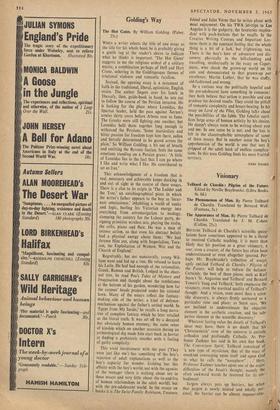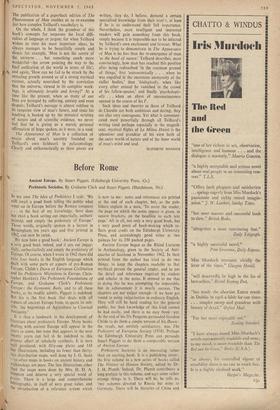Visionary
BECAUSE Teilhard de Chardin's scientific specu- lations have sometimes appeared to be a threat to received Catholic teaching, it is more than likely that his position as a great visionary, a seer, even a creator, of the future has often been underestimated or even altogether ignored. Per- haps Mr. Braybrooke's collection of essays, aptly entitled Teilhard de Chardin : Pilgrim of the Future, will help to redress the balance. Certainly, the best of these pieces, such as Karl Stern's `St. Augustine and Teilhard' and Bernard Towers's 'Jung and Teilhard,' both emphasise the visionary, even the mystical quality of Teilhard's thought. And a vision, even more than a scien- tific discovery, is always firmly anchored to a particular time and place; as Stern says, 'We are inclined to underestimate the objective element in the aesthetic creation, and the sub- jective element in the scientific discovery.'
Whatever lasting value the details of Teilhard's ideas may have, there is no doubt that his `Christocentric' view of the universe is entirely orthodox and profoundly Catholic. As Pro- fessor Zaehner has said in his own fine book. The Convergent Spirit, Teilhard conceived of `a new type of mysticism, that of the mass of mankind converging upon itself and upon God in what he calls the "noosphere" .' Here, Professor Zaehner touches upon one of the major difficulties of the Jesuit's thought, namely the often awkward words he invented for its em- bodiment.
Jargon always puts up barriers, but when that jargon is newly minted and wholly Per- sonal, the barrier can be almost impenetrable. The publication of a paperback edition of The Phenomenon of Man enables us to re-examine Just how complex Teilhard's vocabulary is.
On the whole, I think the grandeur of this book's concepts far surpasses the local diffi- culties of language or jargon; for when Teilhard wishes to state his most important ideas, he always manages to be beautifully simple and direct; for example, `Man is not the centre of the universe . . . but something much more wonderful—the arrow pointing the way to the final unification of the world in terms of life'; and again, 'How can we fail to be struck by the revealing growth around us of a strong mystical current, actually nourished by the conviction that the universe, viewed in its complete work- ings, is ultimately lovable and loving?' At a time like the present, when so many of our lives are besieged by suffering, anxiety and even despair, Teilhard's message is almost sublime in its sanguine view of man's future, and since his teaching is backed up by the minutest scrutiny of nature and of scientific evidence, we never feel that he is giving us a merely personal affirmation of, hope spoken, as it were, in a void.
The Appearance of Man is a collection of essays about man's ancestry founded on 'Feilhard's own fieldwork in palaeontology. Clearly and enthusiastically as these pieces are written, they do, I believe, demand a certain specialised knowledge from their read at least if he is to understand their full importance. Nevertheless, most intelligent and interested readers will gain something from this book, simply because it is impossible not to be infected by Teilhard's own excitement and fervour. What he is trying to demonstrate in The Appearance of Man is no less than the re-emergence of man 'at the head of nature.' Teilhard describes, most convincingly, how man has reached this position after being redissolved in the common ground of things,' first 'astronomically . . . when he was engulfed in the enormous anonymity of the stellar bodies,' then 'biologically, when like every other animal he vanished in the crowd of his fellow-species,' and finally 'psychologic- ally . . . when an abyss of unconsciousness opened in the centre of his I'.
Such ideas and theories as those of Teilhard de Chardin are both ambitious and daring; they are also very courageous. Yet what is communi- cated most powerfully through all Teilhard's writing (and perhaps especially in the magnifi- cent, mystical flights of Le Milieu Divin) is the splendour and grandeur of his view both of the outer world of nature and of the inner world of man's mind and soul.
ELIZABETH JENNINGS







































 Previous page
Previous page